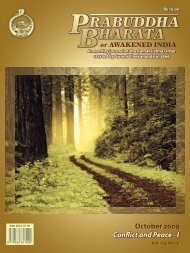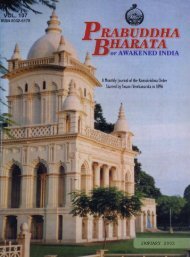According
August 2009 - Advaita Ashrama
August 2009 - Advaita Ashrama
- No tags were found...
You also want an ePaper? Increase the reach of your titles
YUMPU automatically turns print PDFs into web optimized ePapers that Google loves.
Consciousness<br />
Swami Satswarupananda<br />
It is the Sphinx’s riddle: What is consciousness?<br />
It is something we take for granted and<br />
make use of every moment of our lives, with-<br />
out which we are not what we think ourselves to<br />
be, and yet when we want to know it a little deeply,<br />
it eludes us. When we know it, our life’s aim is fulfilled,<br />
we are free from all anxieties, all troubles.<br />
We make use of words like knowledge, consciousness,<br />
awareness, intuition, almost as synonyms. Etymology,<br />
so far as abstract things are concerned, does<br />
not help us much. Usage takes us a long way, but<br />
leaves us short of the destination. Philosophical<br />
books, with their various arguments and conclusions,<br />
confuse us. All this because they try to explain that<br />
which is at the root of all explanations, and nothing<br />
can explain itself by itself. Any argument or explanation,<br />
talk or discussion, from start to finish, is all<br />
consciousness. Neither in dreams nor in the waking<br />
state are we free of it even for a split moment. Being<br />
always in and surrounded by it, how can we say what<br />
it is? For a thing to be known, it must be put in front<br />
of us. Being everywhere under all conditions, in and<br />
around us as well as in and around other things and<br />
beings, it cannot be known, except in bits, leaving<br />
out an almost infinite part of it, thus giving us the<br />
uncomfortable feeling that what little we know does<br />
not authorize us to assert we have known it. Still, no<br />
one, once they start thinking about it, can ever remain<br />
satisfied with a piecemeal knowledge of it.<br />
We shall try to approach the problem from the<br />
PB August 2009<br />
Upanishadic point of view, and see how far the<br />
ancient rishis succeeded in their attempts at unravelling<br />
the mystery of consciousness. But as we<br />
have to put their thoughts and words into English,<br />
we have to add notes on the Sanskrit words and<br />
phrases the rishis have used, and to their English<br />
equivalents as well.<br />
Chit: Feeling-consciousness<br />
Chit is the word the seers have used to indicate<br />
that which we mean by ‘consciousness’. The nearest<br />
translation of this Sanskrit word, especially as it<br />
is used in the Upanishads, is contained in what Sir<br />
John Woodroffe says: ‘It is a feeling- consciousness.’<br />
Explaining this compound word will lead us deep<br />
into its content. Sir John has evidently not used<br />
‘feeling’ to distinguish it from ‘thinking’ and ‘willing’,<br />
which, on the face of it, would be absurd—both<br />
‘thinking’ and ‘willing’ are modes of consciousness<br />
and, therefore, consciousness per se. But ‘thinking’<br />
and ‘willing’ include an element of ‘activeness’<br />
which is absent in the connotation of chit. Again,<br />
the English words ‘knowledge’ and ‘awareness’ have<br />
the same distinction in their implications. When<br />
we say ‘we know’ we mean we exerted ourselves, as<br />
a result of which we know. But when we say ‘we<br />
are conscious of it’ we do not mean we have put<br />
forth any energy for being conscious of it. But that<br />
does not debar the entry of exertion altogether; we<br />
might have exerted previously, the result of which,<br />
455
















